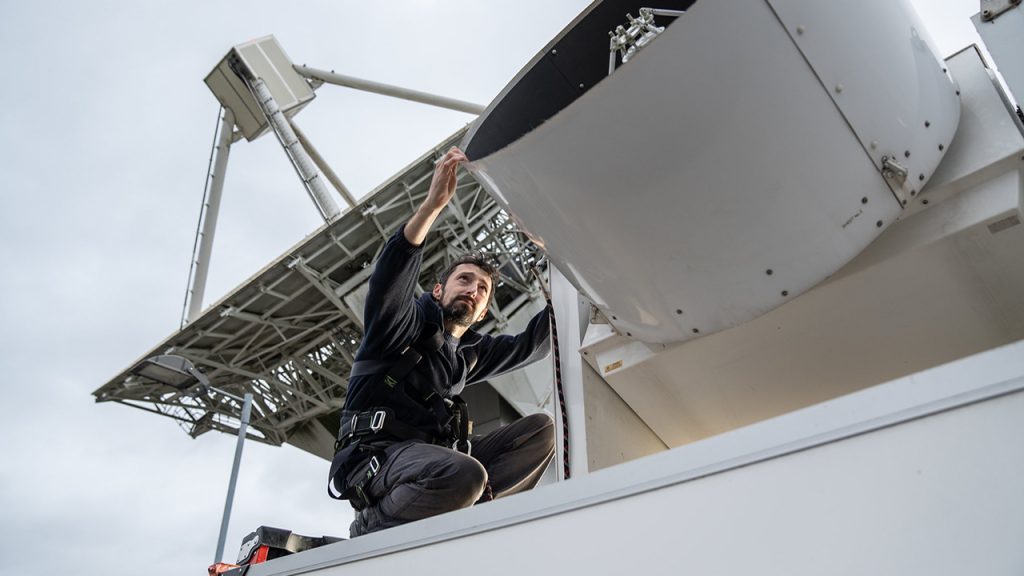
Study weather, cloud, and wind radar fundamentals and applications
Dates: TBC 2026
Location: Fairbairn House, University of Leeds
The Introduction to Atmospheric Radar course aims to support the use of radar-derived data by researchers.
Atmospheric radars can be used to measure cloud properties, precipitation (e.g. rain, hail, and snow), and winds. Radar observations are important for studies relating to climate and extreme weather events. Radar data also have a broad range of additional applications, which extend beyond the confines of atmospheric science.
The National Centre for Atmospheric Science (NCAS) has extensive experience of operating a variety of atmospheric radars, and each one provides a slightly different view of the atmosphere depending on its operating frequency.
The Introduction to Atmospheric Radar course is primarily targeted at PhD students and early career researchers who have limited experience in this field. The course will cover radar fundamentals, dual-polarisation weather radars, cloud radars, and wind profiling radars.
The aim is to provide the basic knowledge and skills required for researchers to use radar-derived atmospheric products within their work. Around half of the course time will be devoted to hands-on data activities based on open-access software. Attendees will ideally already have some experience with the Python programming language. The use of Jupyter Notebooks, which allow attendees to experiment with sample code, will minimise the prerequisite programming skills.
Guest lectures will cover a wider range of topics focusing on specific applications, including hydrological modelling, biological monitoring and advanced multi-radar retrievals.
How to apply
Subscribe to our Reach for the Skies mailing list to be kept in the loop about upcoming courses.
Learning outcomes
By the end of the course students will be able to:
- Understand the fundamentals of atmospheric radar
- Access, process, and analyse radar data using open-source software tools
- Interpret radar observations and associated atmospheric conditions
- Understand the sources of uncertainty, limitations and errors in radar data and how to mitigate them
- Be aware of the different open-access radar datasets that NCAS and the international community have to offer
- Confidently continue their development in atmospheric radar research
Teaching staff
The Introduction to Atmospheric Radar course is taught by by experts in the field from the National Centre for Atmospheric Science.
The key teaching staff will include:
Dr Lindsay Bennett (Radar Instrument Scientist and Course Lead)
Dr David Dufton (Research Fellow in Radar Hydrometeorology and Course Lead)
Dr Ryan Neely III (Associate Professor of Observational Atmospheric Science)
Dr Sarah Barr (Research Fellow in Observational Meteorology)
Dr Chris Walden (Head of the Atmospheric Measurement and Observation Facility (AMOF))
Course schedule
The course will be spread over 5 consecutive days, with the Monday morning and Friday afternoon left free to allow attendees to travel to/from Leeds. The course will run between 9am and 6pm on the intervening days. Data access/analysis sessions will be interspersed with traditional lectures.
Costs
There is a charge to attend the Introduction to Atmospheric Radars course. Once you have been offered a place on this course, you will be asked to pay the course fees via the University of Leeds online store. The course fee includes all tuition, activities and materials. Evening meals will be provided on Monday and Thursday with students at leisure on Tuesday and Wednesday.
Full academic rate: £TBC
Educational discount rate: £TBC
The discounted rate may be available to students and post-doctoral researchers who are not eligible for the for the subsidised rate.
NCAS Subsidised rate: £TBC
This is available for UK and EU students attending UK universities or students supervised by National Centre for Atmospheric Science staff members.
Travel and accommodation
Accommodation is not provided as part of the course and students should arrange their own. Students are responsible for arranging and paying for their own transport to and from the course.
Terms and conditions
Fees
Attendees are required to pay in full by credit/debit card or provide a valid purchase order from their home organisation by the confirmation deadline. All payments and refunds are processed by the University of Leeds.
Cancellations/ refunds
Attendee cancellations are subject to a £50 administration fee, plus any accommodation cancellation costs incurred by us, where the cancellation is made more than six weeks (twelve weeks for the Atmospheric Measurement Summer School) before the date of the training course. The remaining balance of the course fee will be refunded.
No refund is payable for a cancellation made within six weeks immediately prior to the training course – in this event the full course fee will remain payable. In the event that a place can be filled by another student then the full fee (less the £50 administration fee) will be refunded once the replacement student has paid in full.
All cancellations must be sent in writing to training@ncas.ac.uk.
Amendments and cancellations
It may be necessary for us to change the content and timing of a course, the staff, the date or the venue. In the unlikely event of the course being cancelled, we will provide a full refund. For all bookings, the liability of the National Centre for Atmospheric Science/University of Leeds shall be limited to the amount of the fee paid to the National Centre for Atmospheric Science/University of Leeds by the delegate.
